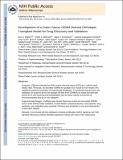Development of a Colon Cancer GEMM-Derived Orthotopic Transplant Model for Drug Discovery and Validation
Author(s)
Martin, Eric S.; Belmont, P. J.; Sinnamon, M. J.; Richard, L. G.; Yuan, J.; Coffee, E. M.; Roper, J.; Lee, L.; Heidari, P.; Goel, G.; Ji, X.; Xie, Z.; Xie, T.; Lamb, J.; Weinrich, S. L.; VanArsdale, T.; Bronson, Roderick T.; Xavier, R. J.; Kan, J. L. C.; Mahmood, Umar; Hung, Kenneth E.; Lunt, Sophia Yunkyungkwon; Vander Heiden, Matthew G.; ... Show more Show less
DownloadVander Heiden_Development of.pdf (2.948Mb)
OPEN_ACCESS_POLICY
Open Access Policy
Creative Commons Attribution-Noncommercial-Share Alike
Terms of use
Metadata
Show full item recordAbstract
Purpose: Effective therapies for KRAS-mutant colorectal cancer (CRC) are a critical unmet clinical need. Previously, we described genetically engineered mouse models (GEMM) for sporadic Kras-mutant and non-mutant CRC suitable for preclinical evaluation of experimental therapeutics. To accelerate drug discovery and validation, we sought to derive low-passage cell lines from GEMM Kras-mutant and wild-type tumors for in vitro screening and transplantation into the native colonic environment of immunocompetent mice for in vivo validation.
Experimental Design: Cell lines were derived from Kras-mutant and non-mutant GEMM tumors under defined media conditions. Growth kinetics, phosphoproteomes, transcriptomes, drug sensitivity, and metabolism were examined. Cell lines were implanted in mice and monitored for in vivo tumor analysis.
Results: Kras-mutant cell lines displayed increased proliferation, mitogen-activated protein kinase signaling, and phosphoinositide-3 kinase signaling. Microarray analysis identified significant overlap with human CRC-related gene signatures, including KRAS-mutant and metastatic CRC. Further analyses revealed enrichment for numerous disease-relevant biologic pathways, including glucose metabolism. Functional assessment in vitro and in vivo validated this finding and highlighted the dependence of Kras-mutant CRC on oncogenic signaling and on aerobic glycolysis.
Conclusions: We have successfully characterized a novel GEMM-derived orthotopic transplant model of human KRAS-mutant CRC. This approach combines in vitro screening capability using low-passage cell lines that recapitulate human CRC and potential for rapid in vivo validation using cell line-derived tumors that develop in the colonic microenvironment of immunocompetent animals. Taken together, this platform is a clear advancement in preclinical CRC models for comprehensive drug discovery and validation efforts.
Date issued
2013-02Department
Massachusetts Institute of Technology. Department of Biology; Koch Institute for Integrative Cancer Research at MITJournal
Clinical Cancer Research
Publisher
American Association for Cancer Research
Citation
Martin, E. S., P. J. Belmont, M. J. Sinnamon, L. G. Richard, J. Yuan, E. M. Coffee, J. Roper, et al. “Development of a Colon Cancer GEMM-Derived Orthotopic Transplant Model for Drug Discovery and Validation.” Clinical Cancer Research 19, no. 11 (February 12, 2013): 2929–2940.
Version: Author's final manuscript
ISSN
1078-0432
1557-3265